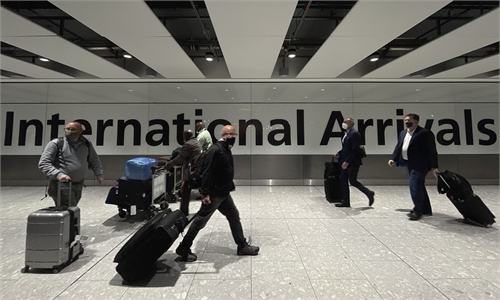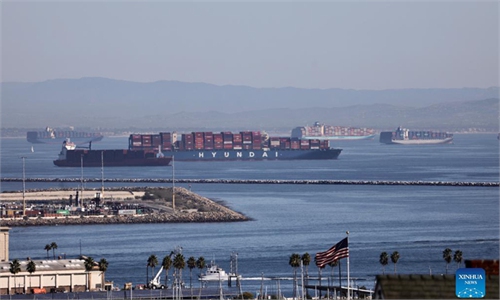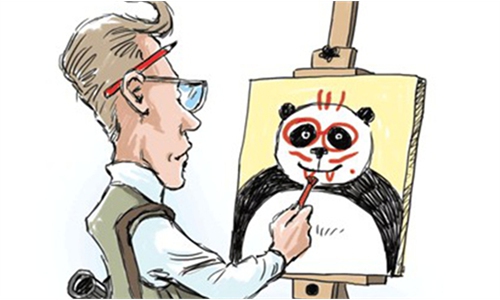Strict control, vaccine research give China edge on Omicron
Inactivated vaccine better in dealing with variants than mRNA vaccine in theory: expert
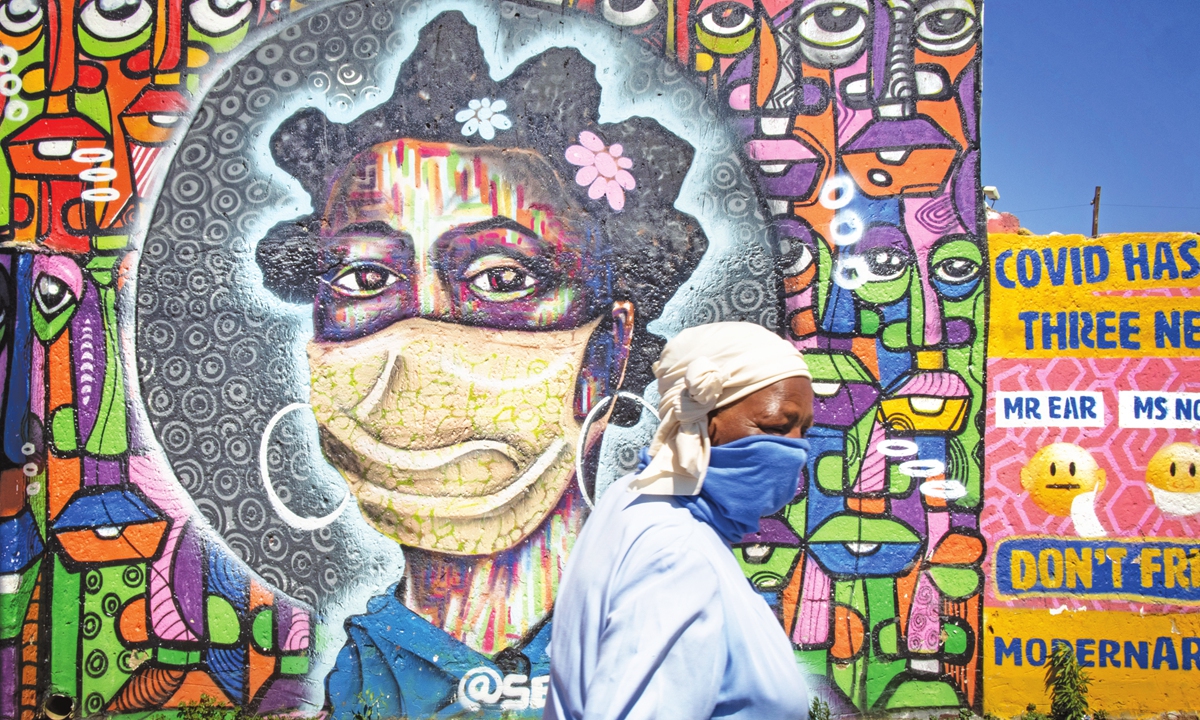
A Soweto resident walks in front of an informative graffiti art work educating local residents about the dangers of the coronavirus, Johannesburg, South Africa, 30 November 2021. Photo: IC
With the world reporting more cases of Omicron variant on Tuesday and more Western countries hastening to close their doors, China, where so far only Hong Kong has reported cases, is calmly and confidently responding to possible challenges with vaccine research and the experience gained from China's dynamic zero-COVID policy.
Chinese observers said that China will benefit from its COVID-19 policy of preventing imported cases and domestic flare-ups which continues to show its unique advantages facing Omicron. In comparison, observers warned that Western countries are likely to be gripped by Omicron if the variant proves highly infectious, with their unscientific easing of epidemic control measures and overconfidence in vaccines.
On Tuesday, Scotland reported three additional cases of the Omicron variant, bringing the total number in the UK to at least 14, media reported.
Although the US has not announced any cases, US President Joe Biden said on Monday that it was "almost inevitable" that Omicron would be found in the US eventually, following cases reported in Canada.
Biden said the country would not go back to lockdowns, and he would lay out his strategy on Thursday for combating the pandemic over the winter, Reuters said.
As of Tuesday, at least 14 countries and regions including Spain, Germany and Australia have detected the variant.
The spread of the Omicron variant to more countries and regions has increased pressure on China to prevent imported cases, Mi Feng, spokesperson of the National Health Commission (NHC), said at Tuesday's media briefing.
But the mutation sites of Omicron do not affect the sensitivity and specificity of mainstream nucleic acid testing reagents in China, indicating that Chinese mainstream testing reagents could cope with Omicron, said Xu Wenbo, director of the National Institute for Viral Disease Control and Prevention under the Chinese Center for Disease Control (CDC) and Prevention.
Xu said that China is technically preparing for the Omicron variant and has done preliminary research into different vaccines, including inactivated vaccines and recombinant protein vaccines, and some Chinese vaccine producers have started preliminary design.
Chinese vaccine producer CanSino told the Global Times on Sunday that the company has started working on vaccines against the new variant. Some Chinese bio-tech companies said their nucleic acid testing kits are upgraded and they are able to detect all prevailing variants, be it Delta, Gamma, Beta or Omicron.
The NHC said that apart from Hong Kong, no other places in China have detected the variant. China's current strategy of preventing imported cases and domestic flare-ups is still effective in fending off the variant.
Regarding concerns about Omicron's effect on the 2022 Beijing Winter Olympics, Zhao Lijian, spokesperson of the Chinese Foreign Ministry, said at Tuesday's media briefing that he is confident the event will proceed smoothly and successfully as China has experience in dealing with coronavirus.
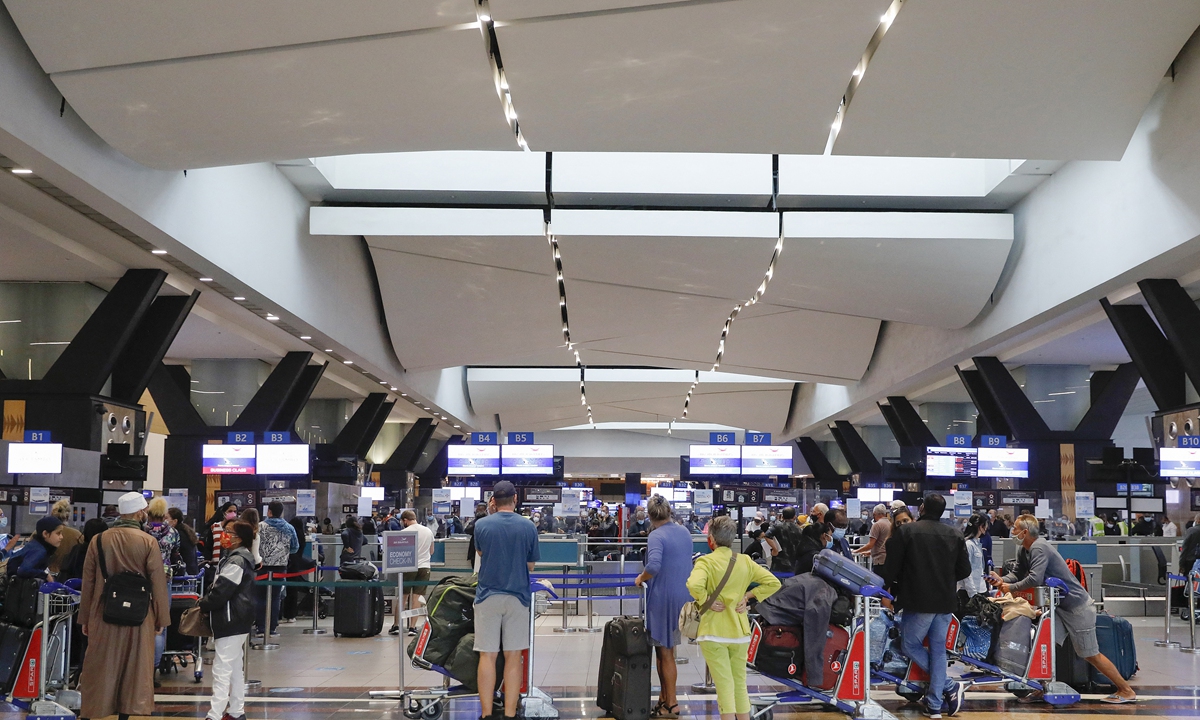
Travelers line up at a check-in counter at OR Tambo International Airport in Johannesburg on November 27, 2021, after several countries banned flights from South Africa following the discovery of a new COVID-19 variant Omicron. Photo: VCG
Unique advantage
Lu Hongzhou, co-director of the Shanghai Public Health Clinical Center at Fudan University, told the Global Times on Tuesday that China's "dynamic zero policy" has proved the most successful with the smallest losses in the world. China has to stick to its strict policies and vaccination programs, especially when herd immunity has not yet been reached.
Calling China's current COVID-19 policy the country's "magic weapon," chief epidemiologist of the Chinese Center for Disease Control and Prevention (CDC) Wu Zunyou said at a Sunday conference that China has to stick to its policies, at least through winter and next spring.
In comparison, measures Western countries have taken to ease controls prematurely can lead to result as "a single spark that starts a prairie fire," as for infectious diseases to spread widely at speed, all it takes is "one fish to slip through the net," Lu said.
The US and some Western countries have adopted a purely vaccine-based epidemic prevention policy because of their over-confidence in their own vaccines, and they have been negligent in other aspects, which has to some extent led to the emergence and rapid spread of the new variant, an immunology expert told Global Times on Tuesday on condition of anonymity.
But to some Western media, China's policy means isolation. CNN said in a report on Monday that as much of the world started to learn to live with COVID-19, China "dug its heels and looked increasingly isolated by comparison."
Chinese observers said that the West's choice of COVID-19 response is to some extent a helpless action as they cannot possibly clear their domestic cases with large numbers of locally transmitted cases, and residents are reluctant to cooperate with governments. In some countries, even the leaders do not follow their own rules.
Biden on Monday urged Americans to wear masks, but he has come under fire for flouting his own rules. He was pictured without a mask covering his face over the Thanksgiving weekend in a shop that had a sign on the window requiring customers to wear face coverings, the BBC reported.
In theory, China's inactivated vaccines are better in terms of dealing with virus variants compared with mRNA vaccines, the immunologist said.
"Because inactivated vaccines are based on the principle of inactivating the complete virus sequence and then injecting it into the body, the body can recognize the complete virus sequence after receiving an inactivated vaccine. As long as the virus retains some of its original characteristics, it can be recognized by the body."
For mRNA vaccines that inject only part of the viral sequence into the body, it is easier for the virus to break through its immunity once a more serious mutation occurs, he explained.
"Nevertheless, specific conclusions will have to wait until the laboratory data are available," he said.
China should also speed up developing an inhaled vaccine that can produce effective antibodies in the respiratory tract after it is inhaled through the mouth, which can offer prolonged protection and prevent spread of the virus, Lu said.
Chinese vaccine producer CanSinoBIO and researchers from the Institute of Military Medicine under the Academy of Military Sciences led by Chen Wei have jointly developed China's first inhaled vaccine, which many experts seen as a promising candidate for booster shots of inactivated vaccines.
WHO's role
Observers pointed out that the WHO's role in leading the world's united fight against the epidemic will become even more important.
Zhao Lijian said on Tuesday that China supports the WHO in continuing to play a leading role in assisting countries in responding to the epidemic and promoting international cooperation against the epidemic.
This week, the World Health Assembly is gathering for a special session during which member states will consider the benefits of developing a WHO convention, agreement or other international instrument on pandemic preparedness and response, the WHO said.
In recent times, the WHO's voice has been influenced from time to time by some Western countries, such as the US which has also affected WHO's authority and leadership to some extent, the anonymous expert said.
"These politicians must be urged to respect and help promote the decisions of WHO scientists, and to reach consensus on the WHO as the international leader in the global fight against the epidemic, which is vital for today's world," he said.

